Telecommunications in Sudan includes fixed and mobile telephones, the Internet, radio, and television. Approximately 12 million out of 45 million people in Sudan use the Internet, mainly on smartphones and mobile computers.
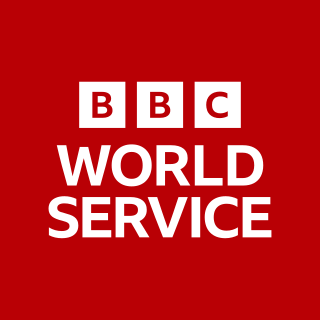
The BBC World Service is an international broadcaster owned and operated by the BBC. It is the world's largest external broadcaster in terms of reception area, language selection and audience reach. It broadcasts radio news, speech and discussions in more than 40 languages to many parts of the world on analogue and digital shortwave platforms, internet streaming, podcasting, satellite, DAB, FM and MW relays. In 2015, the World Service reached an average of 210 million people a week. In November 2016, the BBC announced that it would start broadcasting in additional languages including Amharic and Igbo, in its biggest expansion since the 1940s.

Shortwave radio is radio transmission using shortwave (SW) radio frequencies. There is no official definition of the band, but the range always includes all of the high frequency band (HF), which extends from 3 to 30 MHz ; above the medium frequency band (MF), to the bottom of the VHF band.
International broadcasting, in a limited extent, began during World War I, when German and British stations broadcast press communiqués using Morse code. With the severing of Germany's undersea cables, the wireless telegraph station in Nauen was the country's sole means of long-distance communication.

AM broadcasting is radio broadcasting using amplitude modulation (AM) transmissions. It was the first method developed for making audio radio transmissions, and is still used worldwide, primarily for medium wave transmissions, but also on the longwave and shortwave radio bands.
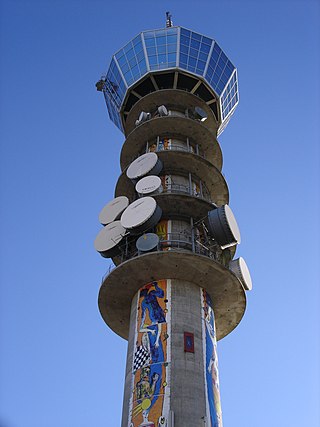
Radio broadcasting is the broadcasting of audio (sound), sometimes with related metadata, by radio waves to radio receivers belonging to a public audience. In terrestrial radio broadcasting the radio waves are broadcast by a land-based radio station, while in satellite radio the radio waves are broadcast by a satellite in Earth orbit. To receive the content the listener must have a broadcast radio receiver (radio). Stations are often affiliated with a radio network that provides content in a common radio format, either in broadcast syndication or simulcast, or both. Radio stations broadcast with several different types of modulation: AM radio stations transmit in AM, FM radio stations transmit in FM, which are older analog audio standards, while newer digital radio stations transmit in several digital audio standards: DAB, HD radio, DRM. Television broadcasting is a separate service that also uses radio frequencies to broadcast television (video) signals.

Radio Televisión Martí is an American state-run radio and television international broadcaster based in Miami, Florida, financed by the federal government of the United States through the U.S. Agency for Global Media. It transmits news in Spanish to Cuba and its broadcasts can also be heard and viewed worldwide through their website and on shortwave radio frequencies.
Radio Canada International (RCI) is the international broadcasting service of the Canadian Broadcasting Corporation (CBC). Prior to 1970, RCI was known as the CBC International Service. The broadcasting service was also previously referred to as the Voice of Canada, broadcasting on shortwave from powerful transmitters in Sackville, New Brunswick. "In its heyday", said Radio World magazine, "Radio Canada International was one of the world's most listened-to international shortwave broadcasters". However, as the result of an 80 percent budget cut, shortwave services were terminated in June 2012, and RCI became accessible exclusively via the Internet. It also reduced its services to five languages and ended production of its own news service.

Radio Havana Cuba is the official government-run international broadcasting station of Cuba. It can be heard in many parts of the world including the United States on shortwave frequencies. Radio Havana, along with Radio Rebelde, Cubavision Television and other Cuban radio and television broadcasts to North, Central and South America via free-to-air programming from the Hispasat 30W-6 satellite over the Atlantic Ocean and via Internet streaming.
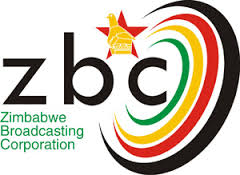
The Zimbabwe Broadcasting Corporation (ZBC) is the state-owned broadcaster in Zimbabwe. It was established as the Rhodesian Broadcasting Corporation (RBC), taking its current name in 1980. Like the RBC before it, the ZBC has been accused of being a government mouthpiece with no editorial independence.
Radio jamming is the deliberate jamming, blocking or interference with wireless communications. In some cases, jammers work by the transmission of radio signals that disrupt communications by decreasing the signal-to-noise ratio.

The Woofferton transmitting station is owned and operated by Encompass Digital Media, as one of the BBC's assets which were handed over as part of the privatization of World Service distribution and transmission in 1997. It is the last remaining UK shortwave broadcasting site, located at Woofferton, south of Ludlow, Shropshire, England. The large site spreads across into neighbouring Herefordshire.
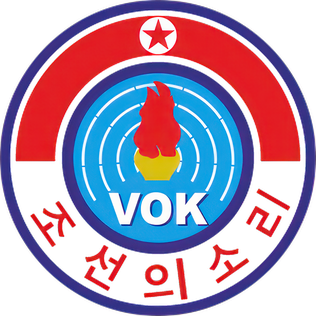
Voice of Korea is the international broadcasting service of North Korea. It broadcasts primarily information in Chinese, Spanish, German, English, French, Russian, Japanese and Arabic. Until 2002 it was known as Radio Pyongyang. The interval signal is identical to that of Korean Central Television.

CKWX is a commercial AM radio station in Vancouver, British Columbia, Canada. Owned by Rogers Sports & Media, it broadcasts an news/talk radio format branded as CityNews 1130. CKWX's studios and offices are located at 2440 Ash Street in the Fairview neighbourhood of Vancouver.

The Voice of Vietnam or VOV is the Vietnamese national radio broadcaster. Directly controlled by the government of Vietnam, it is tasked with propagating the policies of the Party and the laws of the state.
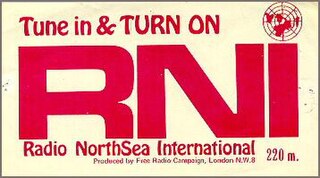
Radio North Sea International was a European offshore radio station run by the Swiss firm Mebo Telecommunications, jointly owned by Swiss engineer Edwin Bollier and his business partner, Erwin Meister. RNI broadcast for less than five years in the early 1970s and, courting both disaster and success, made a modest financial profit.
Radio jamming on the Korean Peninsula makes the border region one of the world's busiest places for radio signals. Medium wave jamming is dominant in the area including Seoul and the Korean Demilitarized Zone (DMZ). South Korea jams all radio and television broadcasts from North Korea, and until 2013 jammed all foreign broadcasts, which was ended during the Park Geun-hye administration.
Radio jamming in China is a form of censorship in the People's Republic of China that involves deliberate attempts by state or Communist Party organs to interfere with radio broadcasts. In most instances, radio jamming targets foreign broadcasters, including Voice of America (VOA), Radio Free Asia, the BBC World Service, Sound of Hope (SOH) and stations based in Taiwan.

Cape Town TV is a community television channel that broadcasts in Cape Town, South Africa. It launched in September 2008 with a one-year, "temporary" license and thereafter won another such license in September 2009. It is a non-profit organisation that is licensed as a community broadcaster in terms of South Africa's Electronic Communications Act.
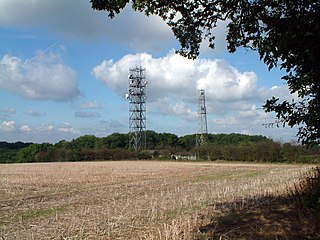
The Tatsfield Receiving Station – known formally as the BBC Engineering Measurement and Receiving Station – was a radio broadcasting signals-receiving and frequency-measuring facility operated by the British Broadcasting Corporation (BBC) on the North Downs just south of London in the United Kingdom.














